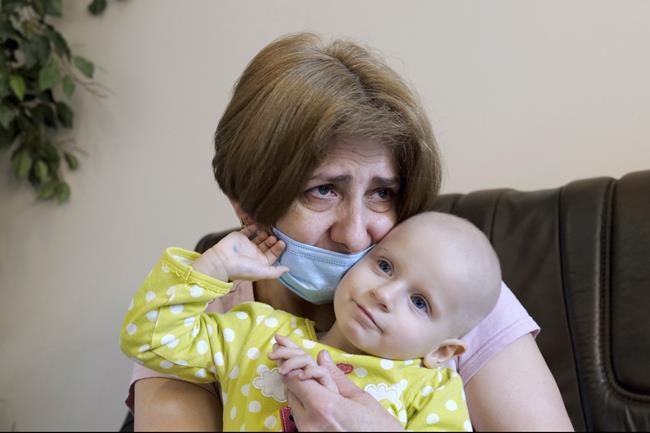Young Ukrainian cancer patients get medical help in Poland
Advertisement
Read this article for free:
or
Already have an account? Log in here »
To continue reading, please subscribe:
Monthly Digital Subscription
$0 for the first 4 weeks*
- Enjoy unlimited reading on winnipegfreepress.com
- Read the E-Edition, our digital replica newspaper
- Access News Break, our award-winning app
- Play interactive puzzles
*No charge for 4 weeks then price increases to the regular rate of $19.00 plus GST every four weeks. Offer available to new and qualified returning subscribers only. Cancel any time.
Monthly Digital Subscription
$4.75/week*
- Enjoy unlimited reading on winnipegfreepress.com
- Read the E-Edition, our digital replica newspaper
- Access News Break, our award-winning app
- Play interactive puzzles
*Billed as $19 plus GST every four weeks. Cancel any time.
To continue reading, please subscribe:
Add Free Press access to your Brandon Sun subscription for only an additional
$1 for the first 4 weeks*
*Your next subscription payment will increase by $1.00 and you will be charged $16.99 plus GST for four weeks. After four weeks, your payment will increase to $23.99 plus GST every four weeks.
Read unlimited articles for free today:
or
Already have an account? Log in here »
Hey there, time traveller!
This article was published 18/03/2022 (1360 days ago), so information in it may no longer be current.
BOCHENIEC, Poland (AP) — Twenty-two-month-old Yeva Vakulenko had been through four rounds of chemotherapy for leukemia at a hospital in Ukraine, and then suffered a relapse. As she began returning again for more treatment, Russia invaded, disrupting doctors’ efforts to cure her.
Air raids forced the toddler to shelter in the basement of the hospital in the western city of Lviv for hours at a time, making her feel even worse. She cried a lot and sought comfort from her grandmother, who is caring for her after her parents were in an accident that left her mother disabled with brain and leg injuries.
So when doctors told Yeva’s grandmother that they could evacuate to Poland, she seized the chance.

“It is very difficult for children to go somewhere in the middle of the night and sit in the basement for a long time,” said Nadia Kryminec as she held her granddaughter, whose sweet-natured smiles gave no hint of the ordeal she has endured.
“We were told that she was in stable condition and we should try to go. Otherwise, she is simply doomed to death,” the grandmother said.
The little girl, who her grandmother says understands everything, is one of more than 400 Ukrainian children with cancer who have been evacuated to a clinic in Poland. Doctors then place them in one of some 200 hospitals in 28 countries.
“We triage the patients when they arrive at our center,” said Dr. Marcin Włodarski, a pediatric hematologist at St. Jude Children’s Research Hospital in Memphis, Tennessee, who is staffing the Unicorn Clinic of Marian Wilemski in Bocheniec, in central Poland.
Stable patients are transferred quickly from there to hospitals in other countries while those in worse condition are first stabilized in Polish hospitals, he said.
“Then they return to us and can be sent for further travel,” Włodarski said.
Decisions have to be made fast because time is critical for the young oncology patients.
The evacuations began immediately after Russia attacked Ukraine on Feb. 24, and is a joint effort of St. Jude, the Polish Society of Pediatric Oncology and Hematology, Poland’s Fundacja Herosi (Heroes Foundation), and Tabletochki, a Ukrainian charity that advocates for children with cancer.
Dr. Marta Salek, another pediatric hematologist oncologist with St. Jude who is staffing the Polish clinic, said the center receives large numbers of patients and convoys that arrive from Lviv through humanitarian corridors.
“At times we can have convoys with only 20-something patients but we can have up to 70 patients at a time and even more,” she said.

At the clinic, a large bin of white unicorn stuffed animals sits in a room, along with a wooden train set, brightly colored balloons and other toys that the children happily play with.
More than 3 million people — about half of them children — have fled Ukraine as the country faces a brutal military onslaught by Russian forces that has targeted civilians. Of those, more than 2 million people have arrived in Poland, the largest of Ukraine’s neighbors to its west. A Polish health ministry official said Friday that the country is treating 1,500 refugees in hospitals, many of whom are suffering hypothermia after their journey, and 840 of whom are children.
The World Health Organization said Friday that cancer is one of the major health challenges resulting from the war. It said it was supporting the effort by the organizations that “are working against the clock to reconnect pediatric cancer patients with their treatments.”
“Cancer itself is a problem, but treatment interruptions, stress and risk of infection mean that hundreds of children might die prematurely,” said Dr. Roman Kizyma, head of the Western Ukrainian Specialized Children’s Medical Centre in Lviv, where the pediatric oncology patients are first stabilized before they are sent across the border into Poland.
“We believe that these are the indirect victims of this war,” Kizyma said in a WHO statement.
Among those at the clinic this week was Anna Riabiko, from Poltava, Ukraine, who was seeking treatment for her daughter Lubov, who has neuroblastoma.
“Treatment is currently impossible in Ukraine. Fighting is taking place, there are no doctors, it is impossible to have surgery or chemotherapy. And even maintenance therapy is also impossible to obtain,” she said. “So we had to look for salvation somewhere.”
It’s not a step that all parents were able to take for their sick children, she said.
“A lot of sick children stayed there,” she said. “Because parents were worried and did not want to go into the unknown.”

___
This story has been corrected to show that the spelling of the Lviv doctor’s last name is Kizyma, not Kizym.
___
Vanessa Gera reported from Warsaw.
___
Follow the AP’s coverage of the war at https://apnews.com/hub/russia-ukraine


